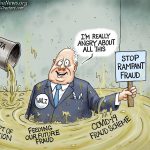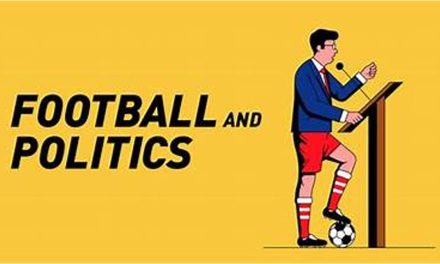
If You Cannot Eliminate the IRS, Can it Be Reformed?

We all know that the income tax system in the United States is complex, costly, and inefficient. It imposes a heavy burden on individuals and businesses, discourages saving and investment, and creates opportunities for tax evasion and tax avoidance through loopholes and special treatments. It is prone to be politicized. It requires a large and intrusive bureaucracy, the Internal Revenue Service (IRS), to administer and enforce it. And … it impacts hardest on the middle and lower economic classes.
In a previous commentary, I made the argument that we should eliminate the Internal Revenue Service (IRS) by eliminating the Income Tax and withholding system. It is arguably the most corrupt and abusive of all the government agencies – largely because of the extraordinary and extra-constitutional powers enjoyed by the Agency.
There is nothing but benefits for the millions of American taxpayers in eliminating the income tax and the IRS, as we know it. Unfortunately, as bad as the current system is for the average taxpayer, the system is supported by a powerful public and private sector establishment. Those benefiting from the current system are tens of thousands of bureaucrats currently employed by the IRS.
Tax attorneys are the third most powerful segment of the American ruling class legal profession – behind lawyer-legislators and government prosecutors. And the other two categories are in full support of the IRS for political, personal and professional reasons.
Then you have all those non-lawyer tax accountants and consultants – from the local H & R Block operations, online services such as Turbo Tax, and the HUGE corporate accounting firms.
The elimination of the income tax in favor of a National Sales Tax – often called a “consumption tax” or “Fair Tax” – would mean that millions of Americans would not have money withheld from their incomes. They would not have to file complicated forms each year. There would be no IRS to seize bank accounts and personal property. There would be no special loopholes for the rich and powerful. It would be virtually impossible for crooks to commit tax fraud. Businesses would save billions of dollars by not having to collect and record income tax – a saving that gets passed on to the consumers.
While Congress, as a whole, has not shown interest in seriously considering eliminating the IRS, Georgia Congressman Buddy Carter has introduced the Fair Tax Act. It would establish a 23 percent tax rate on all retail goods and services – with a monthly rebate to low-income families and individuals. It would repeal all federal income taxes, payroll taxes, estate and gift taxes, and abolish the IRS.
The increase in the cost of goods and services would be more than offset by the enormous savings enjoyed by taxpayers. In addition to individual savings from eliminating the income tax, there are enormous savings to the economy. According to the Tax Foundation, Americans spend $409 billion and 9 billion hours annually to comply with IRS requirements.
But alas … despite the benefits for we the people, the Fair Tax Act is not likely to pass. There are too many powerful interests lined up against us. So … are there any reforms that could at least mitigate some of the IRS’ worst practices?
Here are a few I would be fighting for if I was in Congress.
- The first reform on my list would be to make it illegal for the IRS to seize personal property without having the matter adjudicated. Government can take property under the laws of eminent domain (although those are significantly abused), but the property owner has legal rights and can oppose the seizure. Not so with the IRS. They summarily confiscate. I have never understood why that is not unconstitutional.
- My second reform would be placing limits on interest and penalties for late- or non-payment. Very quickly, the interest – and especially the penalties can cause a person’s liability to increase exponentially to many times the original amount claimed by the IRS. I tend to favor the elimination of ALL penalties – and allow the amount owed to increase by a minimum of three percent or the rate of inflation, whichever is greater.
- Primary residence and basic household property cannot be seized. That ban against seizure would not protect valuable collections, such as valuable art, artifacts, jewelry, antiques, etc. Again, they would only be seized by court order – not the whim and will of the IRS.
- I would forbid the IRS from seizing payroll income from any person with an Adjusted Gross income of less than $25,000 per year – and limit income garnishment to no more than 10 percent for folks with an AGI of $25,001 to $150,000, and no more than 33 percent of those with an AGI over $150,000. Social Security, veteran benefits, disability compensation, etc. would be eliminated from IRS seizure.
- The IRS would be required to pay for all legal fees and other costs when they lose their case in a court of law.
- I would change the internal appeal process so that the agents who issued the order to seize property are not the same people to handle the appeal – and even handle the appeal without the taxpayer knowing it. As insane as that may sound, I know of at least one specific case in which that is exactly what happened.
- I would impose severe penalties on IRS officials who abuse their power by wrongfully seizing property for malicious purposes or use the power of the IRS to benefit family, friends or political allies or to maliciously punish people, businesses or groups.
Today, there is virtually no accountability for abusive and even criminal actions by IRS personnel. The list of reforms could go on and on – and I bet readers could offer up a few of their own recommendations.
I also understand that the scope of positive reforms is so large and complex that it will boggle the minds of many. They will dismiss any reform as a “cannot be done” situation. Folks like me, however, are not intimidated by the size or complexity of the challenge. It is better to fight for what is right rather than acquiesce to what is wrong.
America was not founded with an income tax. There is no IRS in the Constitution. In fact, we operated for 124 of our 234 years as a constitutional republic without an income tax … without withholding … without an IRS … and without tax agents with guns. And now the faint hearts and the compromised souls would have us believe we cannot live without income tax and the IRS. Unfortunately, the IRS is such an intimidating force – with such a powerful constituency – that even our elected representatives are afraid even to speak of reform of the IRS – much less elimination.
So, there ‘tis.





























Cut funding
Nobody likes taxes, everybody wants to pay less, pay as little as possible. It’s the human condition. Larry plays to the masses with his tired old tax tome. At least it’s not the flat tax….
Income taxes were created in 1909, under Taft, a Republican. They added a business tax too. But taxes have always been with us, remember the Revolution? It didn’t get better under Washington. Remember the whiskey rebellion? We have always taxed something; the only questions are what and how much.
There are two variables important — the total amount the government gets; the tax schema (we use income now, Larry wants consumption now). For sake of Larry’s piece, we will assume the total amount is fixed independent of schema used. Otherwise, it’s not the schema that changed — it’s the total tax, the tax rate, something else changed beyond the schema. That is, if you do the schema right and not just to lower the total tax for political reasons. Cuz it certainly can’t be because the budget mysteriously went down, as Republicans love to do, we borrow more.
I do not see, no matter what tax schema you have, that you don’t have an enforcement bureaucracy, under income, fair tax, or anything else. Larry seems to think IRS shrinks under fair tax, but I guess he’s never known anyone, business/customer or both to cheat on a sales tax. And wait until you see the luxury tax grifts. Mexican yachts docked in international waters. There is always a way. No matter what you do, there will be winners and losers as well as cheaters, probably loopholes too whether income tax or fair tax schema.
Likewise, tax schema’s always pick winners and losers. Larry says the current one picks on lower and middle classes, well — who-the-f’s fault is that Mr. Republican? You won’t let us tax the rich to make it fairer. Somehow your tax that lets them off the hook and gigs the rich is a sudden epiphany? No, the fair tax is not fair, and it impacts the lower and middle classes more. Everyone knows it. Larry notes it’s a bill in 2023. I mentioned it’s been introduced every year since 1999. It never comes to a vote. This year Larry wants to party like it’s 1999. But Larry, like Prince, this bill is dead. Nobody likes you bill. The proof the fair tax is not fair is everywhere, and I really doubt that it magically makes the IRS unneeded.
I do agree the code is awful, been getting worse with EVERY President since Reagan — every one. Republicans just do it worse by cutting taxes more while spending more: a financial double jeopardy. And then they tell you defund the IRS, change the tax schema, and everyone will pay less, cheat less, and enjoy that magic bridge they bought.
Frank Stetson, I call B.S. to a large part of your argument. Consumption tax is largely then “voluntary” by it’s nature; if you want less tax, buy less expensive stuff. Further the REAL win with Larry’s / Consumption tax is that it’s ONE SIMPLE RULE. No huge, opaque, complicated REAMS of tax laws. No multi-billion dollar industries profiting off of it. No Constitution-violating seizures of property, homes by (now) Gun-toting “enforcers”. You want the good, you pay the tax. It’s that simple.
Sure there are ways to cheat, they are as you said as old as Man himself. But again, ONE SIMPLE RULE is nowhere near so hard / expensive / bureaucratic to manage as the massive tax laws now are.
Invoking presumptuous and Highly Unlikely fairy tales of still-huge “enforcement” people or Thin-air budget drops / changes / misrepresentations or whatever you are vaguely alluding to, is a Specialty of the Libtards ruining our country today, and also Nothing New.
That said, you are both correct in that It will never happen, at least not in our lifetimes. It still deserves fighting for; nobody ever thought America would happen, either.
Glenn, fair enough. Bear in mind we are talking tax schema’s, consumption tax versus income tax schema. There’s other schema choices too like income AND consumption tax or either of these schema’s with a VAT on top. In any tax plan:
1) Just about any tax schema can be made fair, with enough work
2) All tax schema’s will pick winners and losers, just different ones
3) All tax schema’s, for assessment purposes target retention of existing tax revenues, i.e. — no tax cut on top
My point is any schema can work, all pick will pick winners and losers, and if the bottom line remains the same, when someone is paying less, then someone else is paying more.
That said, an income tax is progressive, a consumption tax is regressive. There really is no discussion. Why? Because the income tax has multiple rates due to income level, the consumption tax is flat. The Fair Tax tries to abort this by adding a “basic basket” level of spending, and a monthly poverty-kickback rebate and that’s an example of my point: any schema can be made more fair, with work…. FYI — Fair Taxes tout their simplicity and therefore low fraud potential, but the monthly poverty rebate not only gets you your money AFTER the fact, but creates a massive Social Security level payment system that will be a prime target for fraud no doubt.
Looking at the basic premise though, imagine if you make median US income, that is — 50% make more, 50% make less than you. That’s $57K, average is about $70K. Average US individual spending is $66K. Get the picture? I am pretty sure you can see how the basic make sort of pushes back, hard, on the “voluntary” concept that you profess as the beauty of the flat tax. The less you make, the less voluntary it looks like unless you voluntarily give up eating, heat, gas….
Now, imagine you make $250K a year; let’s say you spend twice the average or $132K. Get the picture? You have lots to spend on things you don’t have to spend it on and can easily cut back on in needing to save some money.
The rich guy is not taxed on almost 50% of what he brings in, the poor guy is tax on over 100% of his take home. That’s where the Fair Tax “make fair workarounds” kick in. You have your basic theory to take out taxes for basic spending (how do they operationalize that kickback?), and your poverty kick-back for those underwater; that’s a monthly check and probably the top spot for fraud. Plus, you can see how the Fair Tax gets less simple as more and more fairness workarounds are layered on top of the basic schema.
Folks say the beauty of the Fair Tax is you can adjust consumption to set your tax levels. Do you really think the guys at or below the median income can really make a dent by scrimping? If you are spending your paycheck each month, do you really see a meaningful savings by just cutting back? Or does living from paycheck to paycheck actually mean that?
Now look at the sales tax rate: 30%. You hear the Fair Taxers pitch a 23% EFFECTIVE rate which is weasel words for including the poverty kick-back monies as factored in which, unless you are impoverished, won’t affect you and you get the full 30.
Which means: $3/gal gas is now $4. $3,000 heart medicine is now $4,000. $1 soda is $1.30. It’s a steep hill to climb. Folks hated 9% inflation, it was crushing families making them choose between gas and food. Most scream at like 5% inflation —- what do you think a 30% hit will feel like. And that’s right, as far as I can tell, health care, all aspects, are taxed under the Fair Tax. Once again, getting sick can financially ruin you in America —– by design.
I can regale you with many smaller fallacies on the Fair Tax from the massive cost and complexity to migrate to it, to the fact there will be cheating, you will need the IRS still, and the big one —- a poverty kickback with monthly checks that will rival the Social Security payment system — no fraud there, right? But the Fair Tax people say it best when they indicate the 23% take rate can be adjusted each year. Bwhaaaat? Sure, sounds like a plan. A plan where they already know the rate is wrong.
Bottom line: all schema’s can be made fair and by the time the Fair Tax is made fair, it will likely be as cumbersome as the Income Tax. Instead, IMO, just strip the income tax to its brass tax, begin to build back in some deductions, credits, etc. for fairness and to incent agreed-upon extra-supported behaviors like marriage, energy efficiency — whatever, but just a handful of enticements with timing to remove/extend, not permanent. Remove the loopholes for the rich. Up the tax rate for the rich to previous levels under Reagan, Bush, Clinton. There’s lot we can do to make income tax more fair, and easier to use.
GOAL should be that an average American can complete the form without turbo tax in a prescribed time, like 1.5 hours, correctly. Or something simple like that.
But the real bottom line is the Fair Tax can’t pass, neither side of the aisle likes it: for good reasons IMO. And it’s been that way, every year, since 2005. Time to move forward with fixing the Income Tax instead; perhaps with a consumption layer added, or VAT, like Europe and other countries already do.
The Government is not our friend. Period.The sooner people realize this, the better off we’ll all be. Less government the better. Beware of Governments bearing gifts.